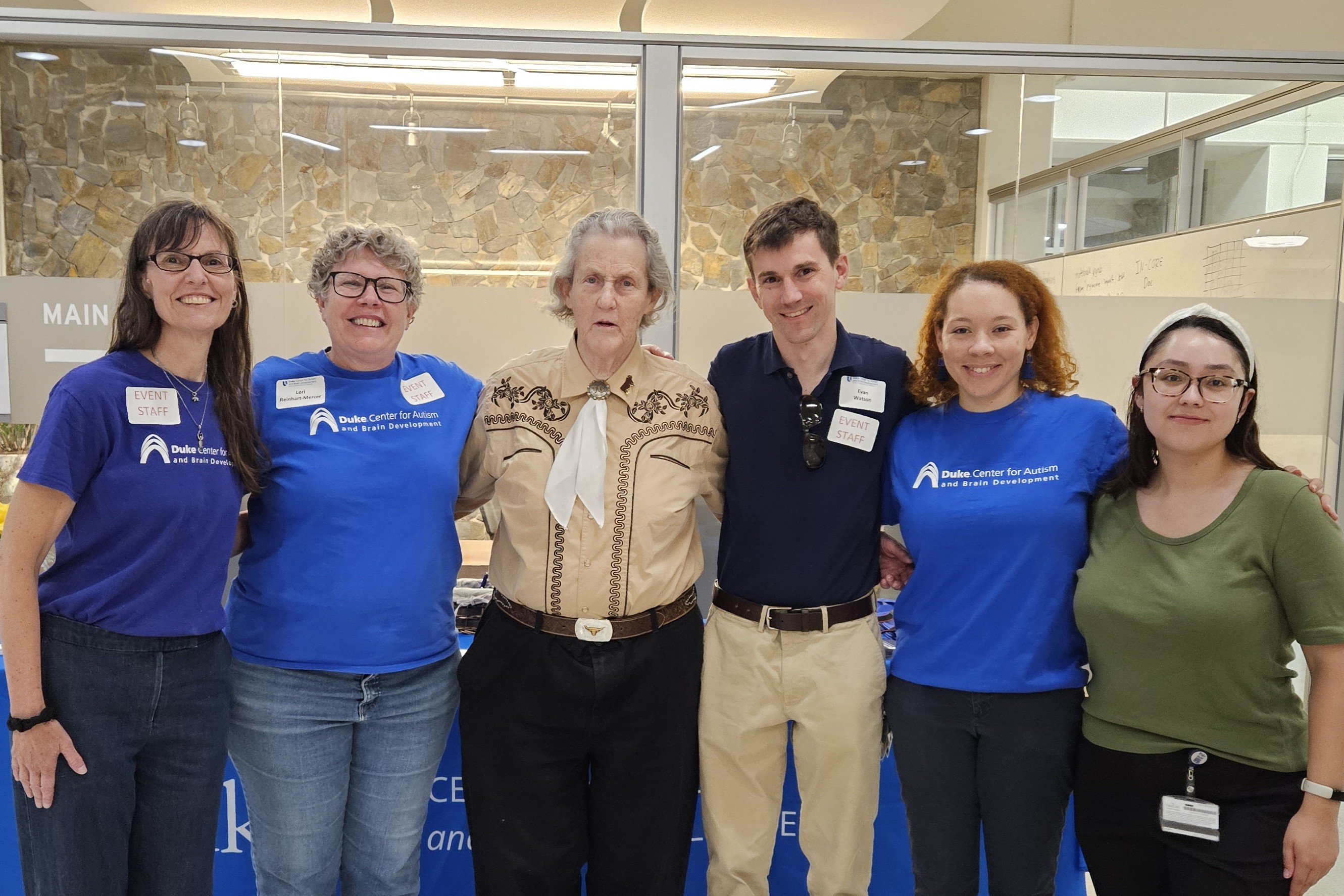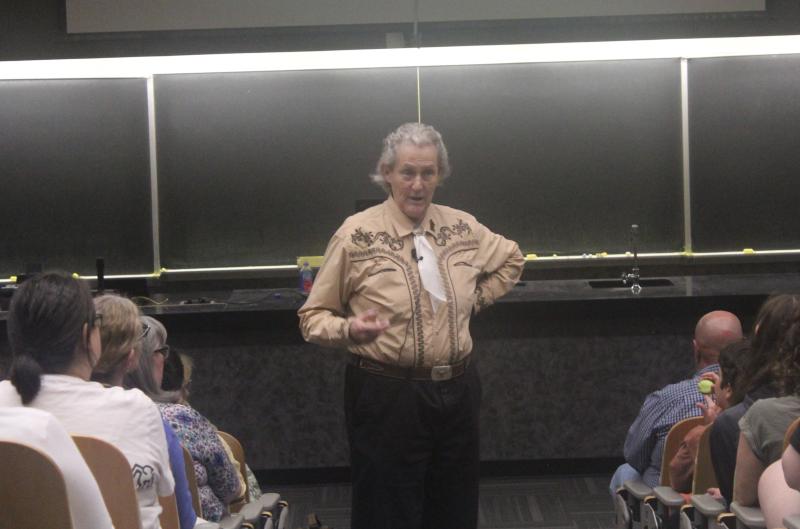
A line of people of all ages eagerly wound their way through the lobby of Duke University’s Gross Hall, many of them hoping to get an autograph and a moment to meet a celebrity in the autism community.
They had come to Duke’s west campus on May 31 to hear Temple Grandin, PhD, discuss connections between animal behavior and autism. The talk was organized by the Durham County Library and co-sponsored by the Durham Library Foundation and the Duke Center for Autism and Brain Development.
Wearing her signature western-style attire, Grandin spoke to a diverse audience of more than 250 attendees in Gross Hall Auditorium. Another 170 viewers watched the live stream online. Some had come because of an interest in animals, and others because of a connection to autism. A translator provided translation for Spanish speakers in the audience.
Grandin, Distinguished Professor of Animal Science at Colorado State University, is a renowned author and speaker on both farm animal welfare and her lived experience as an autistic person. Grandin’s presentation, “Animals Make Us Human,” tapped into both aspects of her expertise, drawing parallels between her own experience as a visual thinker and the sensory psychology of animals.
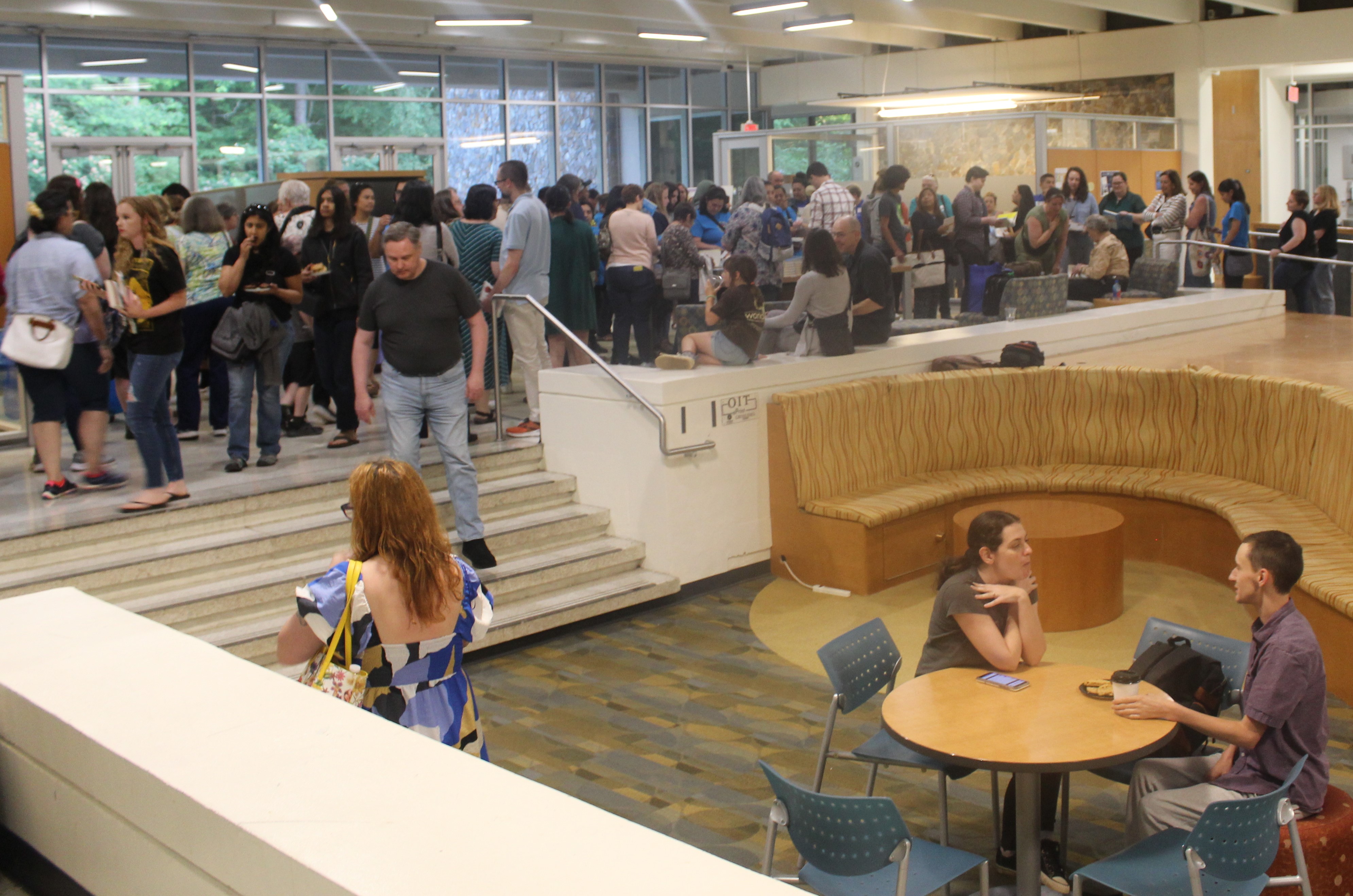
She began by inviting the audience into the mind of a cow, describing how animals navigate their environment through their senses without verbal language. She compared this thinking to the autistic person’s mind. Her talk moved like a sewing needle, stitching together the fabric of these two otherwise unrelated ideas – farm animals and autism – into a tapestry of a shared experience.
The Sensory Emotions of Animals
“I want people to think of animals as sensory-based,” she stressed. “Fear is a core emotion for animals, and it’s associated with specific sensory experiences.” A color, a smell, or a noise associated with a negative experience can trigger a potentially dangerous panic response. According to Grandin, the same sense-triggered distress can be especially strong for autistic people.
Grandin observed that, for both animals and autistic people, “a new thing is attractive when [one is] allowed to approach voluntarily, but frightening when suddenly introduced.” The option to control how they approach a new experience, or a positive first exposure with a safe, familiar person, can make the difference in how a person or an animal responds.
For example, when taking an animal to the veterinarian for the first time, she suggested we “notice what color coat the vet is wearing, and the room where the exam happens. If the animal has a bad experience, maybe don’t wear that coat next time, or have the vet greet the animal outside.”
Grandin showed photos of farm machinery that, to an animal, may look familiar from one angle but like completely new objects from another vantage point. Allowing the animal the choice to approach it will keep them calmer.
“A new thing is attractive when [one is] allowed to approach voluntarily, but frightening when suddenly introduced.” - Temple Grandin
According to Grandin, sudden transitions or the sudden introduction of new objects they haven’t chosen to approach are especially hard for both animals and autistic people because their sensory-based cognition dwarfs any verbal explanation.
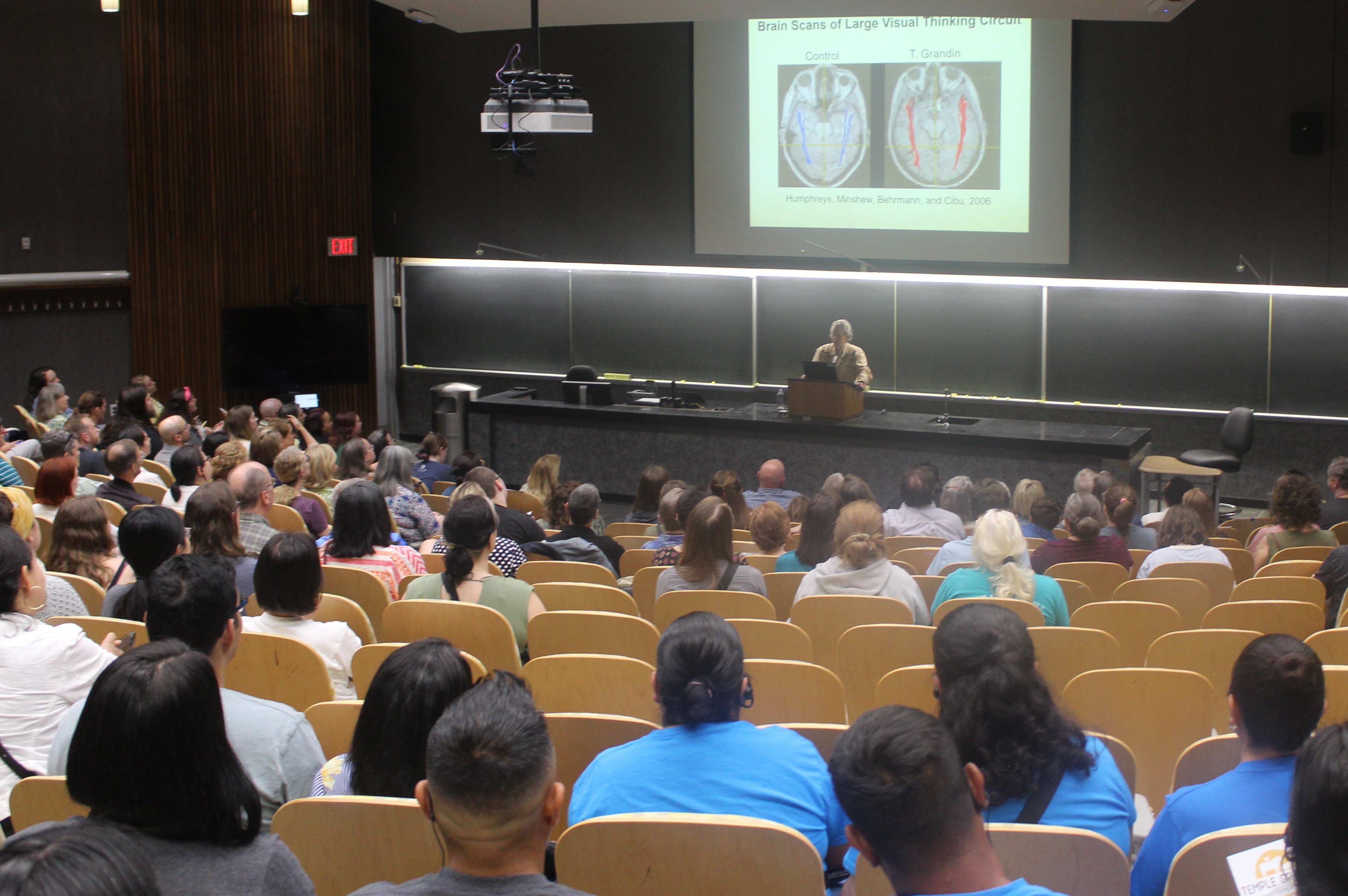
Advice for Autistic Quality of Life and Animal Welfare
“They can do it,” she said, and she advocated for parents to encourage and support their children in these endeavors.
She offered recommendations for society at large. “We’re going to need the different kinds of thinkers. How different people think gives them different problem-solving skills.” She denounced a one-size-fits-all education system that doesn’t support people with different kinds of minds.
“We’re going to need the different kinds of thinkers. How different people think gives them different problem-solving skills.” - Temple Grandin
Partnership with the Durham County Library
Durham County Library staff have worked to improve services and host events for autistic people in the Durham community. Research on autism led the staff to approach Grandin for a keynote event.
“[Grandin] is the person who leads in that conversation, so we felt that’s who we should bring in. Thanks to funding from the Durham Library Foundation, we were able to do exactly that,” said Celeste Holtzmann, Humanities & Adult Programming Coordinator at the Durham County Library.
Jennings Brody, a member of the Durham Library Foundation’s Board of Directors, was “pleasantly surprised to see so many young people,” and glad that “the kids felt like they could raise their hands” during the event’s Q&A. Grandin’s direct and candid manner of speech seemed to encourage the audience to speak freely.
“That’s the beauty of Temple Grandin and the effect she has on people,” said Jordan Grapel, MS, a staff member at the Duke Center for Autism and Brain Development. “Any preconceived ideas about what I might want to talk to her about went out the window. I wanted to hear her takes on so many different topics. It’s one thing to hear her talks or read her books, but it was interesting to sit down with her and see how her mind works in conversation.”
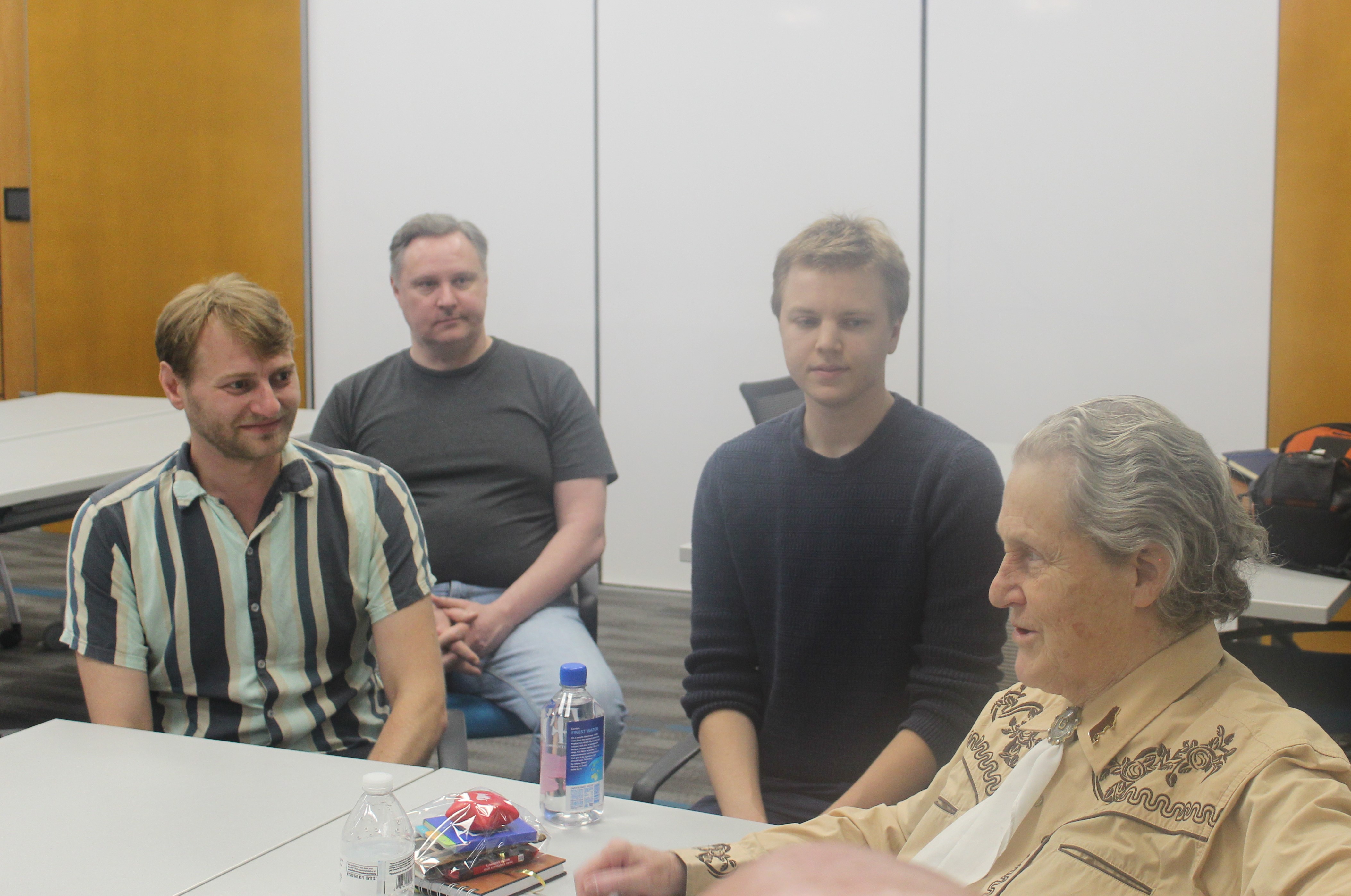
It’s one thing to hear her talks or read her books, but it was interesting to sit down with her and see how her mind works in conversation. - Jordan Grapel, MS
This was not Grandin’s first visit to Duke; she received an honorary doctorate from the university in 2010. When asked what changes she has seen for autistic youth since that time, Grandin praised improved services and public understanding of neurodiversity. Reminiscing on her youth and childhood, she suggested that every community from rural to metropolitan has opportunities for socialization and employment that suit neurodivergent people.
Grandin concluded her talk with recommendations to improve welfare and quality of life for both animals and autistic people. She focused on empathy for different kinds of minds, and creating a society that helps different thinkers thrive and contribute their unique perspectives to the world.
